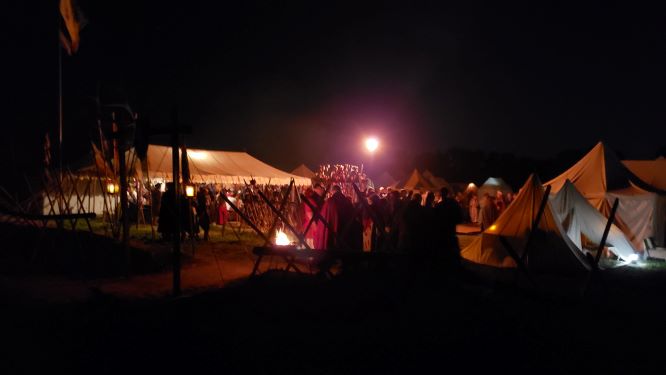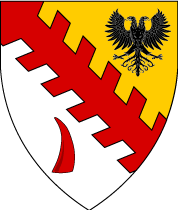No edit summary |
|||
| Line 66: | Line 66: | ||
people as his leisure. | people as his leisure. | ||
'''3. Feldwebel(sergeant):''' Feldwebel is third in command and is | |||
<li> | |||
<li>'''2. Leutnant(Lieutenant):''' Leutnant is second in command to the | |||
Hauptmann and will act as Hauptmann in his absence. | |||
<li> | |||
<li>'''3. Feldwebel(sergeant):''' Feldwebel is third in command and is | |||
responsible for marshaling the troops and upkeep of the | responsible for marshaling the troops and upkeep of the | ||
armory. | armory. | ||
'''4. Fuhnmann(wagon master)''': Fuhnmann is forth in charge and | |||
<li> | |||
<li>'''4. Fuhnmann(wagon master)''': Fuhnmann is forth in charge and | |||
is responsible for the upkeep of the encampment. | is responsible for the upkeep of the encampment. | ||
| Line 79: | Line 86: | ||
feeding the encampment. | feeding the encampment. | ||
1. SturmDoppel: Sturmdoppel is the highest fighting rank. | <li> | ||
<li>'''B. Ranks''' | |||
<li> | |||
<li>'''1. SturmDoppel:''' Sturmdoppel is the highest fighting rank. | |||
Sturmdoppels can only be promoted by a unanimous vote of | Sturmdoppels can only be promoted by a unanimous vote of | ||
the existing Sturmdoppels present at the time. | the existing Sturmdoppels present at the time. | ||
'''2. Doppelsöldner''': Doppelsöldner is the second highest fighting | |||
<li> | |||
<li>'''2. Doppelsöldner''': Doppelsöldner is the second highest fighting | |||
rank. Doppelsöldner can only be promoted by a super majority | rank. Doppelsöldner can only be promoted by a super majority | ||
vote of the existing Doppelsöldner present at the time. They | vote of the existing Doppelsöldner present at the time. They | ||
must own there own period tent in addition to the requirement | must own there own period tent in addition to the requirement | ||
of a becoming a Söldner. | of a becoming a Söldner. | ||
3. Söldner: Söldner is the lowest fighting rank. Söldner's are | |||
<li> | |||
<li>'''3. Söldner''': Söldner is the lowest fighting rank. Söldner's are | |||
promoted by the Hauptmann and must own their own armor | promoted by the Hauptmann and must own their own armor | ||
and garb. | and garb. | ||
4. Rekrut: Rekrut does not hold rank. Rekrut are new prospects | |||
<li> | |||
<li>'''4. Rekrut:''' Rekrut does not hold rank. Rekrut are new prospects | |||
to the unit. They can become members by promotion to the | to the unit. They can become members by promotion to the | ||
rank of söldner or by permission from the Hauptmann. | rank of söldner or by permission from the Hauptmann. | ||
5. Tross(Baggage Train): The Tross is made up of any non fighting | |||
<li> | |||
<li>'''5.''' '''Tross'''(Baggage Train): The Tross is made up of any non fighting | |||
members, (not fighting on that day) or anybody that is camping | members, (not fighting on that day) or anybody that is camping | ||
with us and not fighting. The duties of the Tross is to make sure camp is cleaned up during fighting, help prepare breakfast, lunch | with us and not fighting. The duties of the Tross is to make sure camp is cleaned up during fighting, help prepare breakfast, lunch | ||
| Line 105: | Line 124: | ||
is expected to help out around camp. | is expected to help out around camp. | ||
6. TrossFrau: Non-fighting Women(or men as the case may be) of | |||
<li> | |||
<li>'''6. TrossFrau:''' Non-fighting Women(or men as the case may be) of | |||
the camp. Hirarchy of the Tross is based on the position or rank | the camp. Hirarchy of the Tross is based on the position or rank | ||
held by their spouse. | held by their spouse. | ||
<li>'''7. Frawen''': Frawen is any woman married by law to a member. | |||
“May wife's” or campaign marriages are considered Whuren | |||
8. Whuren: Whuren is any woman attached to one man but not | <li> | ||
<li>'''8. Whuren''': Whuren is any woman attached to one man but not | |||
married. Whuren can become members with permission from | married. Whuren can become members with permission from | ||
the Hauptmann | the Hauptmann | ||
9. Frau: A Frau is any women in camp. Frauen may become a | |||
<li> | |||
<li>'''9. Frau''': A Frau is any women in camp. Frauen may become a | |||
members with permission from the Hauptmann | members with permission from the Hauptmann | ||
Revision as of 20:49, 5 January 2021
| Photo | ||||
|---|---|---|---|---|
 Eberhauer Landsknecht Encampment | ||||
| Information | ||||
| ||||
| Heraldry | ||||
 Per bend Or and argent, a bend raguly gules between a double-headed eagle sable and an elephant's tusk gules |
What's in a name?
The Landsknechte (also rendered as Landsknechts; singular: Landsknecht, pronounced [ˈlantsknɛçt]) were German-speaking mercenaries used in pike and shot formations during the early modern period. Consisting predominantly of pikemen and supporting foot soldiers, their front line was formed by Doppelsöldner ("double-pay men") renowned for their use of arquebus and Zweihänder. They formed the bulk of the Holy Roman Empire's Imperial Army from the late 1400s to the early 1600s.
Locations
Originally Formed in the Barony of Tir Ysgithr Now spread though-out Atenveldt and other Kingdoms.
Members
Unit Structure
A. Officer
Membership
A. Paid Member: A paid member is anybody approved to be a member that has paid there annual dues in full. Paid members will have the right to cast one vote for Hauptmann at elections and will get an opinion in all other activities and decision of the unit.
B. Non-paid member: A non paid member is anybody approved to be a member that has not paid there annual dues in full. Non paid members do not get a vote for Hauptmann and have no say in any decisions of the unit.